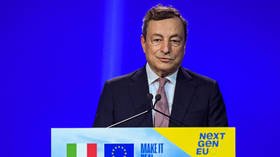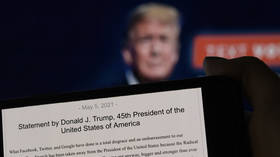Draghi’s misguided U-turn on China is leading Italy back to the EU that broke it

Mario Draghi’s arrival as PM in Rome has coincided with the cooling of ties with Beijing. He seems determined to deliver more of the same old failed reliance on Brussels that has served Italy so poorly in the past.
The US is more important to Italy than any commercial ties the country has with China, said foreign minister Luigi Di Maio recently. This is a sharp change in tone, because just short of two years ago, Italy was arguably the most pro-China country in Europe.
Also on rt.com The US’ fury over the China-Europe investment deal shows how rattled & isolated they are. It’s clear who’s been 2020’s big winnerWhen it signed up to the Belt and Road Initiative (BRI) it promoted panic throughout the rest of the European Union, and the West at large. But it’s not hard to see why this happened. Italy is a country that has faced long-term economic decline and stagnation, plus spiralling public debt, and the public ultimately lost faith in its political system.
The rise of the populist Five Star Movement and anti-Euro sentiment were all products of this long-standing economic crisis, which drove Rome to look elsewhere for partners. EU fiscal policies left a grim legacy, as with Greece and other nations in southern Europe, forcing crippling austerity measures on the country and creating an unequal geographic divide across the continent.
Years later, Italy has little to show for it, as its GDP is significantly less than what it was in 2008, before the financial crisis had exploded. Even before the pandemic, unemployment was an eye-watering 9%. Beijing provided an alternative to the Eurocentric system that had bludgeoned Italy, and it made sense for Rome to pursue it.
Yet despite Italy’s situation being no better – in fact, it is arguably worse due to the economic impact of Covid-19, which has affected its tourist industry badly – the tide has turned on China.
While this has been exacerbated by geopolitical factors, with pressure from Washington and Brussels for Rome to fall into line, a key factor in the cooling of ties has been the demise of Giuseppe Conte’s government at the beginning of this year and the imposition of Mario Draghi, dubbed ‘Super Mario’, as his replacement. Except there’s nothing really super about him, and Wario might be a more fitting description.
A former President of the European Central Bank, Draghi is a token of the Brussels elite and an apologist for the fiscal policies which decimated his country in the first place. Favouring European unity, Draghi had little hesitation in ending Rome’s love-in with Beijing and ending its anti-EU foreign-policy hedge.
He’s moved equally fast to reaffirm Italy's relationship with the United States, promoted tougher policies against Huawei and Chinese companies at large, and even toyed vaguely with the idea of exiting China’s BRI, despite his advisers warning him clearly that such a move would be disastrous.
Also on rt.com Trade with China is key to Europe’s economic recovery, so why is the EU harming that trade with pointless political posturing?Whilst Draghi cannot be compared to anti-China hardliners in some countries, it is quite obvious that he has brushed Italy’s problems with Europe under the carpet.
His answer to all the country’s problems seems to be ‘more of the same,’ as he pushes for more fiscal integration with Brussels while proposing a series of neoliberal economic structural reforms – the very formula that pushed the country to the brink. He’s now taking a huge gamble on the EU recovery fund – which has granted Italy the largest share of the pot – risking, as Politico argues, “the threat of crises similar to that of late 2011” if it does not work. It’s more of the same old failed Euro-capitalism, and it’s no wonder why populist and far-right parties, such as the Brothers of Italy, led by Giorgia Meloni, are topping the polls.
Italian people are desperate for something different, and Draghi’s dogmatic vision doesn’t take into account the pragmatic reality that the closer ties with China provided a commercial and economic alternative to Italy.
What do the so-called ‘values’ of the US and EU relationships provide to Rome? Will Washington reinvigorate Italy from its downward spiral? Of course not, but potential integration with the BRI offered opportunities for Italy to update its ageing, decaying national infrastructure and become a transcontinental route for trade between Europe, the Middle East and North Africa. The Italian peninsula is almost perfectly positioned to do so, something which might even negate the country’s productivity crisis.
The BRI, after all, is more than just about building things; it is a grand vision of commercial and technological exchange which seeks to integrate countries together in new ways. Italy ultimately does not need reform in its economy – which really just involves tying it further to an unequal economic order which has already let it down badly – it needs a complete revitalization, a new sense of purpose.
So it seems strange that Draghi has instead signed up to the Build Back Better infrastructure scheme to compete with Beijing. It begs the question how Italy can help any developing country, if it cannot help itself? Rome is substituting itself for the grand strategy of its ‘allies’ but won’t, ultimately, have anything to show for it.
We all know the Vatican sits in the centre of Rome, but Mario Draghi is arguably a pontiff of his own; a neoliberal one, defending the sanctity of a political and economic order which has been disastrous for Italy in every single aspect, upholding its fiscal doctrines in fundamentalist fashion.
Yes, Italy is proudly European and rightly so, for there is no other country which has shaped the history, culture and intellectual traditions of the continent in quite the same way over thousands of years. However, despite its historical glories, the current country is rotten, and that’s why it had sought new ideas, in recognition of the fact that the EU in its current format is not beneficial.
But not anymore. Draghi is shunning Beijing – and leading Italy back to the Brussels that broke it.
Like this story? Share it with a friend!
The statements, views and opinions expressed in this column are solely those of the author and do not necessarily represent those of RT.
















